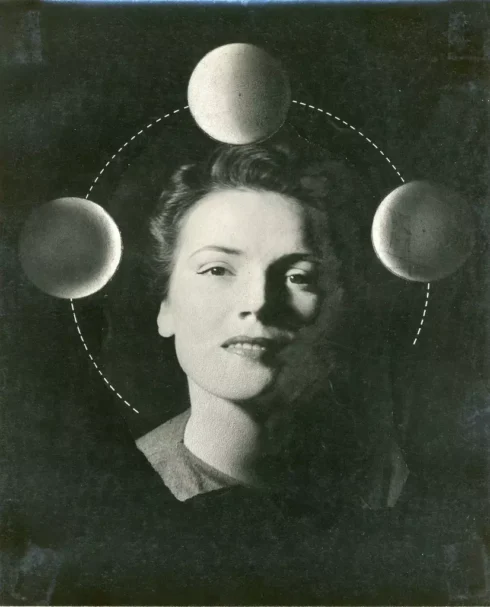
Xanti Alexander Schawinsky
“It is a feeling which he would like to call a sensation of “eternity,” a feeling as of something limitless, unbounded—as it were, “oceanic.” This feeling, he adds, is a purely subjective fact, not an article of faith; it brings with it no assurance of personal immortality.”
Sigmund Freud (Introduction to Civilization and its Discontents. Referring to letter from Rolland)
“ Arabic readers would have been familiar with through the two adaptations of Sophocles’s Oedipus Rex that appeared in 1949 by playwrights Tawfiq al-Hakim and Ali Ahmad Bakathir, as well as the first scholarly Arabic translation in 1939 by Egyptian belle lettrist Taha Husayn. Egyptian dramatist al-Hakim’s version is noteworthy for its innovative interpretation that places the central conflict of the play not between man and fate, but rather between fact and (hidden) truth, a decidedly Freudian reading”
Omnia El Shakry (The Arabic Freud)
“Ignorance has even increased, finding new pretexts in our tortured present.”
Fethi Benslama (Psychoanalysis and the Challenge of Islam)
“The bourgeoisie turns everything into a commodity, hence also the writing of history. It is part of its being, of its condition of existence, to falsify all goods: it falsified the writing of history. And the best paid historiography is that which is best falsified for the purposes of the bourgeoisie.”
Frederich Engels (Preparatory material for the History of Ireland)
There is an eroding trust in science. I speak in very broad terms and in relation, mostly, to the West. I think this is most pronounced in the obvious climate propaganda. When you have adults speaking at global and well financed conferences, attended by all of mass media and advertised well in advance, and when this adult speaker is warning this audience of the dangers of drinking milk (and eating meat of course) because dairy farming somehow is responsible for 20% of whatever it is that is causing this dangerous scary rise of a quarter of a degree Fahrenheit, you know that something is very very wrong.
One would have to be either profoundly indoctrinated (to a degree hard to imagine, actually) or simply stupid, to not grasp the absurdity of such claims. Someone else, at I believe the same conference (on Climate Change), scolded the audience for drinking coffee (for I assume the same reasons).
Now, this is only indirectly related to what I wanted to write about here. But while indirect, it is not unimportant. Aesthetic Resistance posted a podcast, a sort of PSA, really, on fascism and communism. We did this because there is so much confusion about both, and there is a growing conflation of the two. But this lecture (or podcast) reminded me that it is important to question one’s own assumptions. To question the dominant theoretical paradigm, even if you think you know it and can avoid it. This questioning usually reveals that neither you (nor anyone) can avoid it.
And this clumsily segues this discussion to Freud.
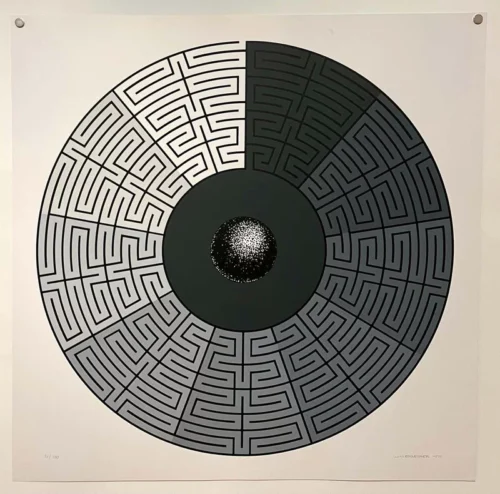
John Willenbecher
“Lacan devoted particular attention to mysticism, conceived in the style of courtly love, as exemplifying an erotics centered on the love of the “good old God.” For Lacan “religion in all its forms” consisted in avoiding a constitutive emptiness (a vacuole) at the heart of the human subject that he terms, following Freud, das Ding, conceived as a radical evil, a death drive, around which man must keep his distance and yet ethically orient himself. The entire process of sublimation, to which Lacan devotes much attention, relates to this confrontation between man and “the deathliness of his drive.”
Omnia El Shakry (Ibid)
I have touched on this in a number of posts on this blog. This (what El Shakry calls) constitutive emptiness is that ‘thing’ that cannot be articulated properly but which is felt or sensed when one traces back (sic) in some attempt to find that which cannot be further reduced. If you reverse engineer consciousness, you inevitably end up with this gap or abeyance, with a space, really, which is not filled. The empty stage that precedes the stage itself. Is this the source of religion? I don’t think so, not quite. But it is the source of this objectification of the world ‘out there’. And it certainly has some kind of relationship with the death drive.
“Like Michel de Certeau, I find that mystical religious literature often shared an epistemological alignment with psychoanalysis. Pursuing the functional analogy between psychoanalysis and mysticism, de Certeau analogizes these two discursive formations as inaugurating the question of the subject, conceiving the body as itself a symbolic language, establishing a dialectic between the hidden and the shown, and asking what remains of the spoken word, all the while authorizing “a critical analysis by establishing a space (be it ‘mystical’ or ‘unconscious’) posited as different but not distant from the configuration organized by those founding principles of the historical system.”
Omnia El Shakry (Ibid)
One example of an Arab Freudian reading (per El Shakry) is Benslama’s take on the Abrahamic story of Cain and Able. Which Benslama saw as the desire to kill the child IN the father. This is indeed a very Freudian reading. And the Freudian dialectic here is one that has rapidly, over the last thirty years I’d say, all but disappeared in Western thinking. Now Benslama sees Islamism as a return of the repressed. And I think this is pretty astute. He is criticized for being essentialist, but I actually have no problem with that.
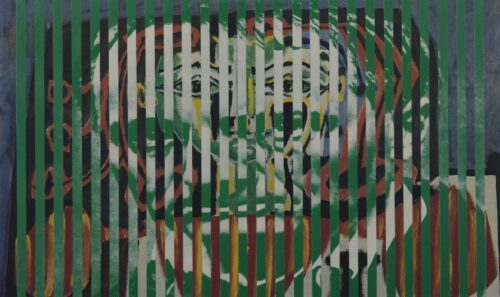
Jirí Kolár (1972)
“One of the causes of Islamist extremism is the catastrophic collapse of language: language was no longer able to translate for people a particularly intense historical experience, that of the modern era, which entails not only the scientific and industrial transformation of the world but also the conjunction between this furious power of transformation and the desire to be an other. Yet “Islamist” extremism is driven by an impulse, and this impulse is simply the inverse of the desire to be an other: “the despair that wills to be Itself,” as Kierkegaard expressed it. What is this Self? Its identity is defined by its origin, and its origin is bound by a framework of unique features: one religion (Islam), one language (Arabic), and one text (the Koran), to which is often added the national anthem here and there. The modern era replaced the desire to be an other with the despair that wllls to be itself, enclosing us in a confrontation each of whose terms represents the impossible.”
Fethi Benslama (Psychoanalysis and the Challenge of Islam)
Here there is an interesting comparison with western Christian societies and the various Muslim nations and areas. (From the Asian Indian and Pakistani muslim culture, to Indonesia and its somewhat hybrid version, to black Sub Saharan cultures and then the North African Maghreb, and Shia Iran, to the East European/Balkan cultures and finally Turkey, and the former Soviet muslim states of Tajikistan, Turkmenistan, Uzbekistan, and Kyrgyzstan.) That is an enormous chunk of the planet.
“If father-identifications are absent in culture and across institutions this spells disaster because Freud’s conception of the human subject is one who must work-through such dependencies. If the subject is deprived of the prior identification, they lack the means to work-through and the culture experiences regressions to a pre-Oedipal condition in which adulthood and stages of self-development are stunted. “
Daniel Tutt (Learning From Freud’s Anti-Politics)
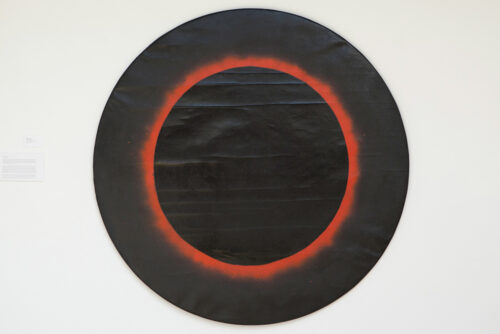
Ben Morea
“To oversimplify the Viconian system of thought beside which I want to place Rieff’s, let me say that Vico in a great panoramic view says the history of the world goes through four stages. First there is the age of the gods, then there is the age of the heroes. And then there is the age of men. This is followed by an interlude of dissolution into barbarism, followed by a cyclical renewal and a return of the gods. “
Norman O. Brown (Rieff’s Fellow Teachers, Salamugundi 1973)
Now in his excellent article on Rieff, Daniel Tutt points out the problem (often raised) regards psychoanalysis and Freudian anthropology overall, and that is that it neutralizes politics.
“This makes psychoanalysis a science which is highly valuable to elites and bourgeois intellectuals, for if rebellion is understood to be an ultimately ephemeral acting out amongst the masses that does not signify anything materially transformative other than temporary demands for the fulfillment of needs, then political ideologies that might rival bourgeois hegemony are forever doomed. If psychoanalysis is an anti-politics this means that psychoanalysis offers a set of Machiavellian insights for how to better rationally manage the irrational tendencies of civilization. “
Daniel Tutt (Ibid)
But this is not entirely true. Or rather it IS true but this is not the entire story. Psychoanalysis does radicalize consciousness, but we might be hard pressed to describe what that looks like. The radicalizing nature of an expanded awareness is a good deal more significant than just temporary demands for fulfillment of needs. Because demanding solutions is actually also the legacy of instrumental thought, and more directly the Enlightenment.
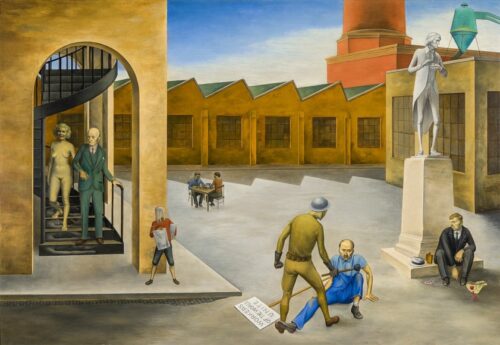
O. Louis Guglielmi
In that lecture, Norman O.Brown said, per Rieff, ‘instead of souls we have neuroses, instead of sacraments we have shows.’
But this preoccupation with origins and with our endgame, with destiny, or death, is naturally what Islamic approaches to Freud trend toward. Rieff is important (I agree with Tutt on this and I hadn’t looked at Rieff for a while, I admit) in that he was, finally, a philosopher as much as anything else. Tutt quotes Lukacs describing the bourgeois cultural sphere, pre WW1: “the keenest over sensitivity, combined with a suddenly erupting, often hysterical brutality.” This does sound a good deal like social media today. The bourgeoisie (white at least) of today has reached a crises that at least partly is related to the erosion of literacy. Benslama is right, the fanaticism of Islamic fundamentalism is connected to the ‘word’. Or perhaps, more accurately, toi the loss of the word. Now Rieff, in his last works (a sort of trilogy under the umbrella title of Sacred Order/Social Order) wrote:
“We tore down religion but began venerating art as something transcendent. We tore down morality, but asked sociology to tell us how to live. We went from faith in an infinite God through whom anything is possible to faith in an infinite technology through which anything is possible, looking to it for existential answers the way our ancestors prayed to idols for a good harvest.We replaced everything that once limited our behavior with something toothless, but still we begged it to tell us what to do. We can …destroy ourselves in our fight against authority — but we will never destroy authority. People cannot live by therapy alone. They can only die by it.”
Philip Rieff (Sacred Order/Social Order)
This loss of literacy, combined with the veneration (even if somewhat empty) of technology, and the infantilism of western culture overall, has meant that art has long since been abandoned, and replaced with entertainment, while simultaneously there has been this loss of curiosity; nobody asks for existential answers. Nobody knows what an existential question even looks like. Forty years on from Rieff’s pronouncements the cultural landscape is far more barren and denuded. Entertainment is almost identical to state propaganda now, save for things like the recent Mike Tyson fight (a near 60 year old former champ with a history of medical problems and a bum knee pretending to fight a young Youtuber (sic) who is famous for being famous (or near famous for being near famous). The fight was rather obviously a show match, like American wrestling (sportstainment). The internet has sort of made entertainment even more stupid and empty than it was, say, thirty or so years ago. This was almost simulacra. It was simply an marketed event that relied on short term memory loss and limited concentration. Modernism is long dead. I saw personally, of course, the death throws of western theatre. I saw what Hollywood was becoming (it always was, to a degree, hostile to art, but some managed to get made anyway) and that a certain class of psychopathy was reigning over all production and bankrolling.
But to return to Freud, again, for remarkably Freud looms as even more relevant than he was during Rieff’s lifetime.
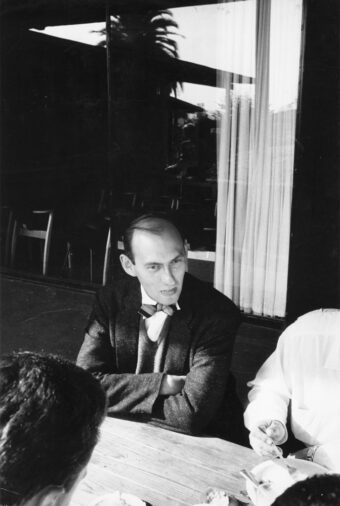
Philip Rieff
“And yet, as Ranjana Khanna has detailed, psychoanalysis has been widely used by theorists of decolonization ranging from Aimé Césaire to Frantz Fanon, remarking that it was not possible to “think of selfhood entirely independently of psychoanalysis.{ } …conventional narratives of Arab intellectual history focus on colonialism as a formative rupture that split twentieth-century thought (and subjects) into liberal secular and religious trends. Moroccan historian Abdallah Laroui and Egyptian political theorist Anouar Abdel-Malek, for instance, expound the twentieth-century Arab intellectual as the product of the struggle for the reconquest of identity in the face of a constitutive self alienation created by the colonial encounter. For Laroui and others, the intelligentsia’s response to colonialism and European hegemony led to two dominant trends, traditionalist Islamic thought and modernist thought—the former characterized by a repetitive recitation of the past or an alienation through time, and the latter by an eclecticism characteristic of ideological backwardness, or an alienation through space.”
Omnia El Shakry (Ibid)
Related to the discussion of colonialism, its logic and the role of melancholia in the colonial subject, is something the Aesthetic Resistance podcasts recently devoted an entire lecture on, and that is western Capitalist revisionism. Brown, in his lecture on Rieff, mentions Marx and then quotes Hannah Arendt. Now this is 1973, so Arendt had not yet undergone the deeper analysis (sic) of her work that has taken place since, but the quote implicates Stalin (and Brown then Mao) as somehow a a signifier for violence.
“The consistent elimination of conviction as a motive for action Hannah Arendt considered a matter of record, since the great terror under Stalin.”
Norman O. Brown (Ibid)
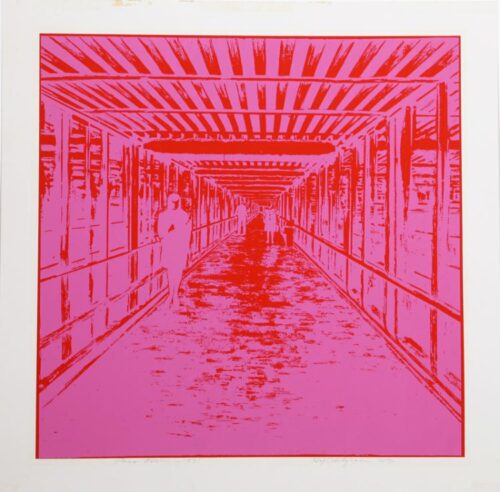
Roy Ahlgren
This is of course typical of western academics, sadly. Even the brilliant. And we were just discussing colonialism. A three hundred year grand terror of great systematic violence. It is without question the most significant and foundational violence of modern history. Not to mention there are questions regarding the *great terror* of Stalin. Arendt, who of course, carried on a life long (nearly) affair with enthusiastic Nazi Martin Heidegger. But beyond the obvious issues with Arendt, there looms issues with western Academia. And Rieff’s reputation has certainly suffered because of the increasingly instrumentalized nature of academic gatekeepers, and the problem of Rieff’s style and the nature of ‘what’ he chose to write about. His book on Freud (well, they are all in some way about Freud), The Mind of the Moralist, is probably seen as the most acceptable. The later Fellow Teachers and his final trilogy are simply unclassifiable and hence have been disappeared. Ignored.
“There are so-called friends, self-styled friends of the Chinese people, whom even some Chinese unthinkingly accept as friends. But such friends can only be classed with Li Lin-fu, the prime minister in the Tang Dynasty who was notorious as a man with “honey on his lips and murder in his heart”. They are indeed “friends” with “honey on their lips and murder in their hearts”. Who are these people? They are the imperialists who profess sympathy with China. However, there are friends of another kind, friends who have real sympathy with us and regard us as brothers. Who are they? They are the Soviet people and Stalin.”
Mao (Stalin, Friend of the Chinese People, 1939)
The violence of western Imperialism dwarfs the violence of any other state or system. Its not even close. The record is not a secret; the Irish famines, the Bengal famine, the genocides of Herero people, the genocide of Tazmanian people, King Leopolds slave colony that wiped out a third of the population of the Congo. And on and on and on. Not to mention Hiroshima and Nagasaki. And today an ongoing genocide in Palestine.
So, the question of Freud does not exist in a vacuum.

Craig Kauffman
“I do not know what biological discipline ought to accompany the aesthetic and sociological in strengthening the minds and hearts of our students; my intuition would be microbiology, with its deeply concealed bacterial cultures and procedures for revealing them. “
Philip Rieff (Fellow Teachers)
Rieff was fascinated by footnotes (of which the above is one example). And I think this is not a ideosyncresy. For Rieff, the hidden knowledge was the entire idea of education.
“Moreover, the new mass-media predigest everything and can reproduce everything as intellectual nullities, finished products; that I consider dead knowledge, suitable for the training of technicians but not for the education of intellects strong enough to feel their ways through works of art and science.”
Philip Rieff (Ibid)
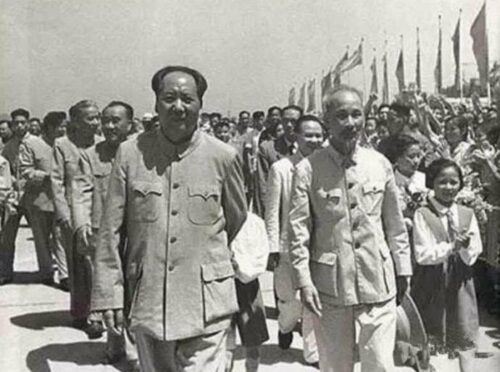
Mao, with Ho Chi Minh, 1955, Peking (Beijing)
This idea of tracing back consciousness to its most basic aspect, its almost invisible quark like ‘something’. Das ding. The constitutive emptiness, the gap which one can illustrate in a sense with early childhood development theory. This haunts our psyche.
“One model of subjectivity and its relationship to agency comes to us from Tausk (1919) and his study of the origins of the notion of an “influencing machine” in schizophrenics. In the final form of the illness, patients experience a sense of transitivism, in which they feel totally passive and subject to the control of a seemingly externalized (projected) influencing machine, which originally constituted their own mind and body organs. In their deteriorated disembodiment, in other words, they regressively recapitulate the origins of their assumption of their being. Tausk believed that an infant is born as a psyche that has the task of discovering its putatively alien body and then owning it (both of which it accomplishes by way of “identification through projection” followed by “introjection”), following which it claims it. Before it claims it, however, the body and its parts are like marionettes to the psyche (see von Kleist, 1810), which it manipulates as strange effigies, a phenomenon that returns in reverse in the final stages of an untreated schizophrenic psychosis.”
James S. Grotstein (Who Is the Dreamer, Who Dreams the Dream?)
This gets complicated, very quickly. But it has crucial importance for psychoanalysis as a liberating practice. Lacan talked specifically of that which haunts or inhabits the unconscious.
Grotstein references a remark from his friend and colleague Marcia Ricci Pinheiro:
“By opening up the gap or space between my image and myself, such that I realize I am, not my image, I can begin to dis-identify from images, from narcissism, and in this way my self as “subject” may emerge. … The self as “subject” lives through negation of the self as image. … Although we suffer from “castration”—the “cut” that makes a “hole” or “gap” between subject and object (or subject and image)—such “castration” at the same time liberates us from narcissistic capture by the image.”
There is a distinct relationship in this theorising with ‘mimesis’ and with theatre itself. The infant enters the play at the moment, (or moments, or period) of recognising this gap. Or misrecognising it. I am not my image. Or am I?
“The unconscious, or”prjmary system as Freud sometimes caffs it, “is unable to do anything but wish.” But between the wish and its enactment lies a whole set of psychic snares – repression, partial amnesia, displacement, sublimation. Consequently not merely the neurotic but everyone suffers from “a sort of ignorance. As an object of the mind the body is misunderstood and simplified in a variety of projective and symbolic ways. The complex schemes of mental anatomy which Freud first drew in Chapter 7 of ‘The Interpretation of Dreams’ – and later redrew in ‘The Ego and the Id’- assert at least this: the instinctual forces are obscure and an extensive portion of the unconscious , the core of our being, will remain inaccessible to consciousness.”
Philip Rieff (Freud, the Mind of the Moralist)
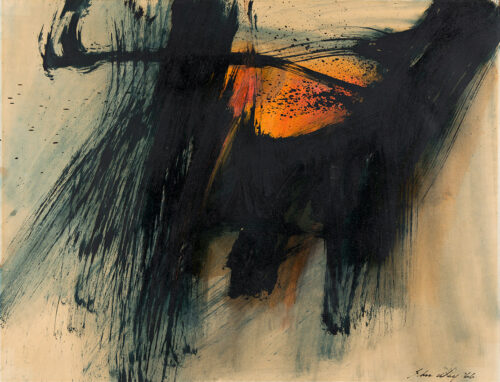
Wei Letang (Way John)
“In the field’s early years, the politics of the analytic community largely reflected these seeds of subversion: first-generation analysts, including many Marxists and women, were cultural and political rebels who criticized dominant conceptualizations of sexuality, education, and the relationship between the individual and the state (Aron & Starr, 2013; Jacoby, 1983). Early analysts saw the conditions of the social order reflected in individual symptomology, and thus viewed mental health care as an embodied sociopolitical critique—a sort of activism (Tauber, 2012). They h psychoanalysis would both liberate individuals from repressed states and deepen our understanding of the sociopolitical matrix, facilitating change in social conditions.They did not conceive of psychoanalysis as a specialized treatment for the few, but rather advocated free, public psychotherapy clinics (Aron & Starr, 2013; Danto, 2005).”
Amber M. Trotter (Psychoanalysis As a Subversive Phenomenon)
Psychoanalysis became synonymous with psychiatry in the US, especially after WW2. Psychotropics and chemical warehousing further eliminated the radical nature and sensibility of the original Vienna circle. The practice was medicalized and shorn of any heterodox theorising.
“Examining psychoanalysis as a subversive phenomenon requires an exploration of subversionitself. Subversive phenomenon—distinct from both historically revolutionary and contemporarily countercultural movements—fundamentally disrupt or pervert a prevailing status quo. Subversive forces alter the way things are.”
Amber M. Trotter (Ibid)
Now Dr. Trotter is a sharp writer and the book on psychoanalysis as subversive is hugely useful, but its also problematic. Without going into real detail the political aspect is entirely within the Capitalist framework — there is scant questioning of its inherent irrationality. There are smart descriptions of American society, and these descriptions are critiqued, to a degree, but always without any political analysis. (No Marx in other words). And this returns me to Islam again, because the western academic is going to look at Islam from the position of ‘what is wrong’? What is wrong with Islam? Nothing, so far as I can tell. What is wrong with Christianity is not something I hear often. What is wrong with Hinduism? No, not ever heard that either. After 9/11 in fact, and now again under sway of Zionist dominated media, we are getting the ‘whats wrong with Islam’ meme again. So I am suggesting two themes here; one is the Orientalism of western psychoanalysts and the political implications (and intersections), and two the creating of mental architecture models, or how to talk about consciousness and this ‘das ding’ question.

Billy Al Bengston
“The concepts of secret, crypt, incorporation, and the phantom enlarge upon or redirect the Freudian definition of personal identity as beset by unconscious conflicts, desires, and fantasies. Freudian theories rely on the concept of latency: beside an emotion expressed, behind a symptom manifested, there lurks a contrary, repressed emotion. Yet this censored emotion erupts whenever repression momentarily relaxes its grip. What is forced out of consciousness can force its way back. In contrast to this Freudian structure of oppositions, Abraham and Torok explore the mental landscapes of submerged family secrets and traumatic tombs in which, for example, actual events are treated as if they had never occurred. Instead of the shifting fortunes of opponents locked in combat (repression versus repressed instinct), what matters is the preservation of a shut-up or excluded reality. “
Nicholas Land (Introduction to The Shell and the Kernal, Abraham and Torok)
There is another aspect of the unconscious which deserves mention. The sexual symbolism of dreams, for example, retain their symbolic affect even after being unearthed, as it were. This is something I sense Lacan was puzzled about. And curious. And Laplanche, too.
“If we follow Freud in his scheme of analogical embeddings, the relation of the Unconscious to the Conscious should be of the same type as that, on a deeper level, of the organic Kernel to the psychic Envelope. Just as drives translate organic demands into the language of the Unconscious, so it utilizes the vehicle of affect or fantasy in order to move into the realm of the Conscious. Thus the appropriate emissaries enact a passage each time from a Kernel to its Periphery. Are there messages moving in the opposite direction, from the Envelope to the Kernel? This might be the case of memory traces in particular, the “vestiges of perception.” At first sight, Freud’s response seems to be negative as the problem of the so-called dual inscription would attest. Given that the trace of the same past receives different functions in the various psychic systems, one would be inclined to conclude that it is inscribed simultaneously and separately in each one of the systems. Hence the recollection of a repressed memory in the course of therapy would not modify its localization in the Unconscious, but would only liberate—not without dynamic effect, moreover— its twin inscribed in the Preconscious. This would explain how, even after being brought to consciousness, dream representations retain their value of sexual symbolism. Obviously, if the inscription is double, the duplicated trace cannot serve as a nucleo-peripheral relay. However, there is another well-known Freudian model of mnemic functioning, the “mystic writing pad,” suggesting that the inscription must occur once and for all, provided that this happens neither in the Unconscious nor in the Preconscious, but in a typically intermediary region: in the region of contact, so to speak, between the Kernel and the Periphery. “
Nicholas Abraham & Maria Torok (The Shell and the Kernal)

Tiberias Sea, Galilee, 1930. Palestine.
There seems no way to avoid this idea of theatre. Our own repertory troupe in the mind. A company of one. But we have memorized our role. And our earliest psychic discoveries or traumas are like Punch & Judy shows. The various retreat(s) from this ‘gap’, this abeyance; found in that mis recognition (if) …this originary positing of a self — which is negative. We are not that image ‘over there’. We only know what we are not, in a sense. We are not that. But WHAT is THAT?
There is a side bar here (and it also interconnects with Rieff) in the so called ‘looking glass theory’ of Charles Horton Cooley. The idea being ones sense of self is primarily dictated by how one thinks others see one. Our identity is shaped by our preception of how others see us and then how we imagine they feel about what they see, (Cooley was hugely admired by Rieff, interestingly, and if this sounds a bit like Erving Goffman, there is a connection there, too, as Goffman was at the University of Chicago at the same time as Rieff.
End side bar. The hubris of the West today, of the US as a dying empire, which it is, means its dying is going to be a cataclysmic collapse, first economically (already happening) and then socially and culturally. The war machine lurches forward but there are large logistical problems, and the trend is decidedly toward privitized militaries anyway. The greatest need today is for teachers. Teachers will precede artists. We don’t need anymore scientists. I think teachers includes psychoanalysts and philosophers. I think that daily I encounter people whose inability to talk intelligently about ANYTHING is a remarkable fact. There are very few reviewers of art or even entertainment worth reading. Actually almost none. There are very few academic professors worth reading today. Alive today. Jameson is gone now. John Berger is gone. TJ Clark is very old. Jonathan Crary is great, and still teaching. Certainly there are many still alive but today they function as outliers in a sense. Academia promotes non thinking. This is an increasingly censorial culture (as Tutt put it). It is also reflexively reactionary. And I think radical psychoanalytic thinking is a huge necessity. What Dr. Trotter wrote about the original class of men (and women) around Freud is true. Russell Jacoby exhaustively covered this in his book Social Amnesia. But it is interesting that Rieff was married to young Susan Sontag. The Sontag who hugely admired the educator Paul Goodman. And Rieff is not totally unlike Goodman. Rieff is also a difficult stylist. His books are dense and the later ones the next stage past dense. In this he is not unlike Adorno. And these topics will take us back to the idea of a liberal secular norm. One that is so well entrenched as to be invisible.
“ Examining the encounter between psychoanalysis and Islam brings to the surface something like the political unconscious of psychoanalysis itself as a secular science and a secular clinic, as well as the broader reliance of some psychoanalytic thought on the equation of political conviction with fanaticism.”
Alberto Toscano (Fanaticism)
Somehow Islam is seen as failing in its secularization. One hears ‘oh, Islam never had a Reformation’. This was quite popular after 9/11. Toscano traces the simplistic version of Islam back to Hegel, who called Islam ‘the Revolution of the East’.
“Abstraction swayed the minds of the Mahometans. Their object was, to establish an abstract worship, and they struggled for its accomplishment with the greatest enthusiasm. This enthusiasm was Fanaticism, that is, an enthusiasm for something abstract – for an abstract thought which sustains a negative position towards the established order of things. It is the essence of fanaticism to bear only a desolating destructive relation to the concrete.”
Hegel (Philosophy of History)
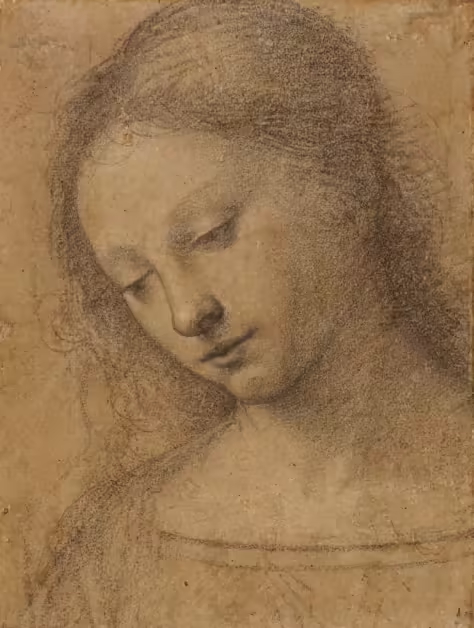
Fra Bartelmelo (1490s)
This clearly set the precedent for ‘Islam – as – fanatic’. Unlike Christianity, the norm, which was identified (in Hegel) with freedom. Hegel actually is rather fascinated and favourably inclined toward the Muslim world. But even when admiring he is juxtaposing Islam with a more *advanced* West. And here the issue of this dominant paradigm idea surfaces again. The grammar of the West sets the conditions for the discourse. This was something Edward Said outlined definitively.
“{ Edward }Said proposed a defence of humanist secularism which did not leave it open to the possessive, secularizing philosophies of history which are so prone to pontificate about ‘our’ (Christian) legacy of atheism, toleration, liberalism and so on. Said referred to Vico’s verum factum principle, ‘the secular notion that the historical world is made by men and women, and not by God, and that it can be understood rationally according the principle formulated by Vico in New Science, that we can really know only what we make or, to put it differently, we can know things according to the way they were made’. Against Anidjar’s suggestion that secularism translates into the cunning of a ‘Christian imperialism’, it is important to defend the idea, crucial to Freudian psychoanalysis, of secularism as a kind of methodological atheism – a praxis-centred, materialist and naturalist inquiry into transindividual behaviour and “inquiry into transindividual behaviour and psychic structure which, to paraphrase Althusser, would strive ‘not to tell itself stories’. ”
Alberto Toscano (Ibid)
The point regards psychoanalysis and Islam is that colonialism is simply forgotten.
“Earlier rationales-the Monroe Doctrine, Manifest Destiny, and so forth-lead to “world responsibility,” which exactly corresponds to the growth in the United States’ global interests after World War Two and to the conception of its enormous power as formulated by the foreign policy and intellectual elite. In a persuasively clear account of what damage this has done, Richard Barnet notes that a United States military intervention in the Third World had occurred every year between 1945 and 1967 (when he stopped counting). Since that time, the United States has been impressively active, most notably during the Gulf War of 1991, when 65o,ooo troops were dispatched 6,ooo miles to turn back an Iraqi invasion of a United States ally. Such interventions, Barnet says in The Roots of War, have “all the elements of a powerful imperial creed…a sense of mission, historical necessity, and evangelical fervor.”
Edward Said (Culture and Imperialism)
Before concluding, I wanted to quote Jameson …
“ Even the Freudian model of the unconscious, which has been exemplary in our own proposal of a properly political unconscious here, is everywhere subverted by the neo-Freudian nostalgia for some ultimate moment of cure, in which the dynamics of the unconscious proper rise to the light of day and of consciousness and are somehow “integrated” in an active lucidity about ourselves and the determinations of our desires and our behavior.”
Fredric Jameson (The Political Unconscious)
The cure is, as Jameson notes later, a myth. But it is also itself an ideological legacy of Enlightenment belief (and Christian) in redemption and solution.
“ But in the Marxian system, only a collective unity—whether that of a particular class, the proletariat, or of its “organ of consciousness,” the revolutionary party—can achieve this transparency; the individual subject is always positioned within the social totality (and this is the sense of Althusser’s insistence on the permanence of ideology).”
Fredric Jameson (Ibid)
Jameson concludes his chapter (or nearly so) with another cogent observation. The persistence of instrumental thinking, and the trap of Utopianism.
“We must, however, ask whether even such a theory as Durkheim’s can be said to elude Marshall Sahlins’ critique of instrumental conceptions of culture as we have outlined it at the beginning of this chapter. There would, in other words, seem to persist an instrumental or functional view of culture and religion even here, since the symbolic affirmation of the unity of society is understood as playing a vital role in the health, survival and reproduction of the social formation in question. In fact, few enough aesthetic systems proper—apart from those of religious inspiration—have been able to dispense with some hypothesis as to the ultimate social functionality of art; only Heidegger’s great vision of the work of art as the momentary glimpse of Being itself comes to mind as a purely secular and nonfunctional model of culture; and even in the case of Heidegger, a theological reading of the late texts is certainly possible, as is a political and social one in which the polis (the temple) and the peasant community (the pair of peasant shoes, and the “Feldweg”) are invoked in the service of an essentially protofascist celebration of the social order.”
Fredric Jameson (Ibid)
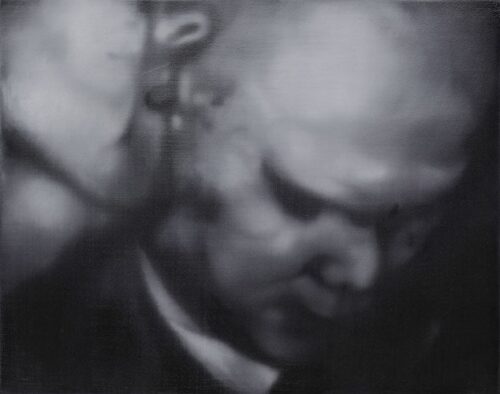
Johannes Kahrs
The lesson of Rieff, at least from the later works, is to not search for a *cure*. That hostility to culture and art is a modern phenomenon. And that the process of uncovering, or unconcealment (Heidegger) is to return to the original radical impulses of psychoanalysis. While there is a paradox in this, since the idea was to lessen pain, the overriding impulse was to discover the clues previously unseen. Optical instruments were being discovered all the time in the early years of psychoanalysis, and this search for the hidden truth was very much the engine for early Freudians. But not only the search, but an acceptance of contradiction; that the discovery was not a missing part of a puzzle. There was still no decision on what that puzzle was. Hence the idea of Islam needs to seen from a perspective that recognised the Imperialist stamp, the Islamic unconscious was probably as unknowable to the Westerner as any other unconscious. Acceptance of failure, but seen as at worst something uncanny — the sense Lacan (not always by any means) took from Freud, and certainly what Althusser took, was that ideas bordering on mysticism were perhaps the places most free of ideological biases. Rieff saw in Hitler (as Brown observed) the failed artist. And by extension we live today in a society that mass produces failed and bad artists. Rieff calls Hitler ‘the armed bohemian’.
“Thus the teacher, in Rieff’s presentation, emerges finally as the equivalent of Dostoyevski’s Grand Inquisitor. I am fully aware of what I’m saying and how terrible that vision is. According to Rieff our duty as teachers is “the enforcement of intellect on ourselves and reluctant students.” We must be masters of guilt and of the knowledge of guilt, he says. Commenting on the novelist John Barth, he writes that “All giftedness, like Barth’s, signifies guilt – although all guilt does not signify giftedness, for to become gifted, guilt must take on the form of privileged knowledge. This is to say: our guilt must be instructed. For a true culture, there must be masters of the knowledge of guilt.”The stern severity with which he pursues the logic of the Grand Inquisitor is shown in another passage: “The human being is born a criminal. To praise the infantile is to praise criminality. You and I, fellow teachers, are the real police, whether we like it or not. No culture can survive without police of our sort – priests and teachers.” The deeper chords of Rieff’s meaning are struck when he says “fear is not a bad teacher of certain elementary lessons.” Principium sapientiae timor dei – the beginning of wisdom is the fear of the Lord.”
Norman O. Brown (Ibid)
To donate to this blog (and to the Aesthetic Resistance podcasts) use the paypal button at the top of the page. Or if on substack use Stripe.

Speak Your Mind